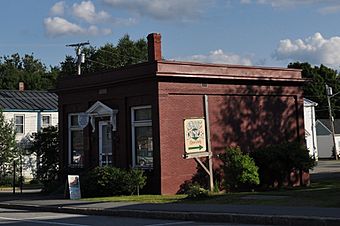Rangeley Trust Company Building facts for kids
Quick facts for kids |
|
|
Rangeley Trust Company Building
|
|
 |
|
| Location | 60 Main St., Rangeley, Maine |
|---|---|
| Area | less than one acre |
| Built | 1905 |
| Architect | William R. Miller |
| Architectural style | Classical Revival |
| NRHP reference No. | 89000846 |
| Added to NRHP | July 13, 1989 |
The Rangeley Trust Company Building is a historic old building in Rangeley, Maine. It stands at 60 Main Street in the center of town. This building used to be a bank, but today it is home to the Rangeley Lakes Region Historical Society Museum.
It is a one-story building made of brick. It was designed by an architect named William R. Miller. The building was built in 1905 and 1906. It was very important because it was Rangeley's first brick business building. It also housed the town's first bank. From 1922 to 1979, it even served as Rangeley's town hall. The building was added to the National Register of Historic Places in 1989.
Discover the Rangeley Trust Company Building
What Does the Building Look Like?
The Rangeley Trust Company Building is a small, one-story building. It is made of brick and has a flat roof. The building faces east on Main Street in Rangeley village. The front of the building has three sections. The main entrance is in the middle section. Above the door, there is a decorative triangle shape called a pediment. It has small block-like decorations called dentils.
On each side of the entrance, there are large windows. Above these windows are smaller windows called transom windows. Brick columns, known as pilasters, frame these windows. The top of the building's front, called the facade, has a wide decorative band. This band is topped by a wooden cornice and a low brick wall, or parapet.
Inside, the main room was once the bank lobby. It has wooden panels on the lower part of the walls, called wainscoting. Towards the back of the building, there is a strong room called a vault. There was also an office for the bank president. Stairs lead down to the basement. In the basement, there is a small metal jail cell. This cell is located right under the vault.
A Look at the Building's History
The town of Rangeley was started in 1860. It grew a lot in the late 1800s. This growth happened because Rangeley Lake became famous for fishing. Many people came to the area for outdoor vacations.
The Rangeley Trust Company was started in 1905. A local businessman named Harry Furbish founded it. He was involved in lumber and insurance. He wanted the bank to help the area's economy grow. Furbish hired Lewiston architect William R. Miller to design the building. The bank opened for business in 1906.
Harry Furbish ran his businesses from this building until 1922. At that time, the bank moved to a larger location. The building was then changed to be used as the town hall. The basement jail cell was likely added around this time. In 1979, the town gave the building to the local historical society. Today, the society uses it as their main office and museum.



